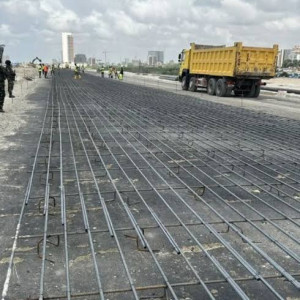NEF decries exclusion of North from critical road, rail infrastructure funding, seeks immediate redress


The Northern Elders Forum (NEF) has strongly criticized the Federal Government for what it described as the systematic exclusion of Northern Nigeria--particularly the North East--from critical road and railway infrastructure funding.
In a statement issued on Wednesday and signed by NEF spokesperson, Professor Abubakar Jika Jiddere, the forum said recent capital investment patterns reveal a deeply troubling regional imbalance, heavily favoring the South while neglecting the North's urgent infrastructure needs. "The Federal Government of Nigeria (FGN) has recently approved the allocation of funds for some road projects in the country. The Northern Elders Forum (NEF) has observed with dismay the lopsidedness in the allocation of funds to the disadvantage of the North generally and the North East in particular," the statement read.
"This amounts to the systematic exclusion of Northern Nigeria in the allocation of federal infrastructure funding, particularly in road and railway development and the NEF is gravely concerned about it."
The forum acknowledged projects such as the Abuja-Kano Expressway (?252 billion) and the Wusasa-Jos Road (?18 billion) in the North Central and North West but dismissed them as insufficient and "largely tokenistic" when compared with major allocations to the South. Among the projects highlighted by NEF as evidence of disparity are:
Lagos-Calabar Coastal Highway - ?1.344 trillion
Delta section of Lagos-Calabar Highway - ?470.9 billion
Second Niger Bridge (completion) - ?148 billion
Lagos-Ibadan Expressway (Phase 2) - ?195 billion
Lokoja-Benin Road - ?305 billion
Third Mainland Bridge structural work - ?3.571 billion
Ado-Ikere-Igede Road - ?5.4 billion
Onitsha-Owerri Expressway - ?22 billion
By contrast, NEF argued that several critical roads in the North remain in disrepair, including the Jalingo-Numan-Yola-Bama road and the Bauchi-Gombe route. The group also drew attention to highways connecting Gombe to Maiduguri through towns such as Biu, Gombi, Mubi, Madagali, and Gwoza, as well as the Damaturu-Gashua-Gaidam-Damasak-Gubio corridor.
"It is important to note that some of these projects, like the Lokoja-Benin Road, often listed as a Northern project, merely passes through Lokoja, which is being utilized as a logistical corridor to the South. This shows how the North's geography is exploited to facilitate Southern trade and transport, with no corresponding developmental investments in the Northern region itself," the statement added. In addition to road concerns, the forum expressed alarm over the state of the railway infrastructure in the North, singling out the collapse of the Eastern rail line stretching to Maiduguri.
"Most notably, the eastern rail line extending to Maiduguri (North East)... has remained inactive for over a decade, with operations effectively halted for 10-15 years," the NEF said.
"While the Federal Government has recently initiated or completed modern rail projects predominantly in the South... there has been no corresponding rehabilitation or modernization of the Northern rail lines." The group called out the Nigerian Railway Corporation (NRC) and the Ministry of Transportation for allowing the Northern network to collapse, demanding a full explanation and a detailed plan for northern rail rehabilitation.
"Why has the Nigerian Railway Corporation (NRC) allowed the Northern rail network to deteriorate to a state of near-total collapse? "Why are recent railway expansions concentrated almost entirely in the South, with little or no inclusion of the long-neglected Northern lines?
"When will the critical Port Harcourt-Maiduguri Eastern Rail Line be restored and upgraded to serve the millions of citizens and industries across the North East and North Central?" The NEF argued that the North, despite contributing significantly to national productivity through agriculture, mining, and trade, continues to be excluded from developmental planning.
"The North contributes significantly to Nigeria's economy through agriculture, mining, livestock, and transnational trade. It hosts the largest population, widest territory, and the greatest number of local governments, yet it is systematically excluded from national development initiatives.
"This exclusion is not only an infrastructural failure, it is a national threat. It risks deepening inequality, inflaming regional tensions, and undermining the very unity of the Republic." NEF therefore demanded:"Immediate inclusion of North East Road and railway infrastructure in the national development portfolio.
"A public explanation from both the Federal Ministry of Works and the Nigerian Railway Corporation (NRC) regarding the gross disparities in regional infrastructure allocations. "A binding commitment from Northern lawmakers, governors, and ministers to reject any federal budget or policy framework that does not ensure balanced and inclusive infrastructure development. "This is a defining moment for Nigeria's leadership.
The choice is clear: equity or exclusion, unity or fracture.
If Nigeria is to endure as one nation, no region, especially not the North, can be treated as expendable."